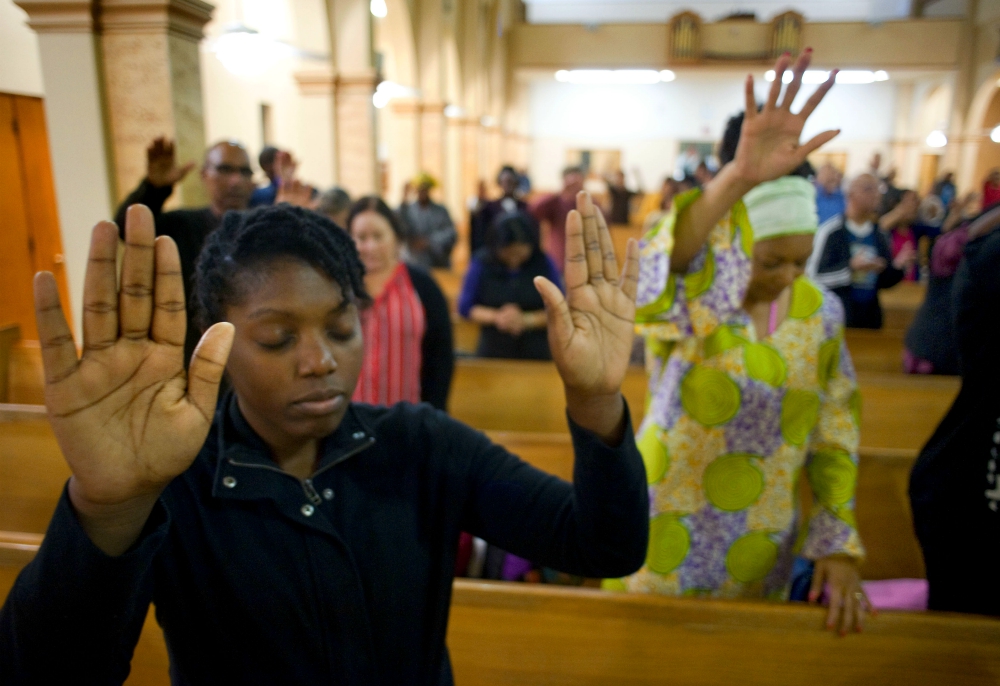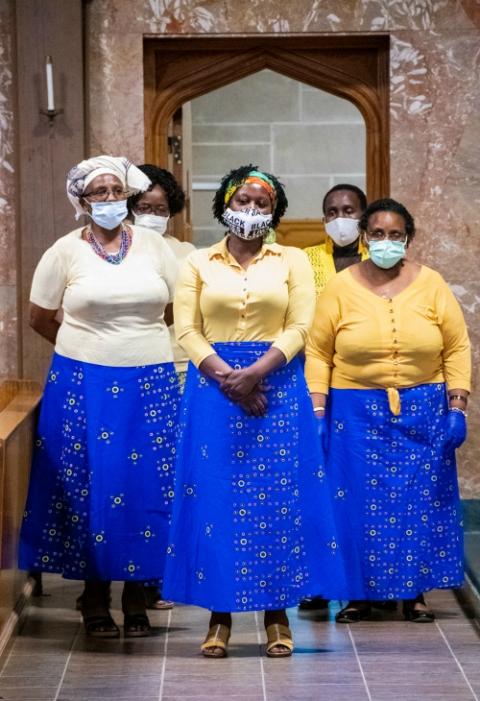
A young woman prays on the second evening of an African American Catholic revival celebration Feb. 6, 2018, at St. Rita's Catholic Church in San Diego. (CNS/David Maung)
Were you there when they crucified my Lord?
Were you there when they crucified my Lord?
Oh, oh, oh ... sometimes it causes me to tremble ... tremble ... tremble
Were you there when they crucified my Lord?*
Black Catholic women on North American shores live at the foot of the cross. We wailed when so-called masters sold our parents, partners and children, then used our bodies for forced pleasure, cruel abuse and punishment. We screamed when unchecked employers exploited our bodies for underpaid and unrewarded labor. We waited in segregated churches while ministers forced us to accept separate sacraments. We persisted when our vocations to religious life were rejected, disrespected or relegated to demeaning ministries.
We led the movement and rode buses for freedom as mobs bombed and beat us along the way. We watch as our men, our siblings and our children are lynched on ropes, under knees, while out jogging and in their beds. We die in agony as we ourselves are crucified, killed on the lynch trees.
We weep, pray and sing in our homes, our churches, on marches, in jails, in schools and before our United States Catholic bishops, proclaiming what it means to be Black and Catholic.
Sometimes I feel like a motherless child
Sometimes I feel like a motherless child
Sometimes I feel like a motherless child
A long way from home*
And now we grieve and lament as our Black bodies, still bearing the crosses of individual, communal and systemic racism, die disproportionately from COVID-19 and Black men and women continue to die daily from lynching in numbers as high as during the early years of the last century.
Oh when I come to die, oh when I come to die
Oh when I come to die give me Jesus
Give me Jesus, give me Jesus
You can have all this world, give me Jesus*
Black Catholic women know the view of the world from under and on the cross. It is in response to these experiences that our African traditions, our African American practices, our deep relationship with Jesus, our Black ways of being and doing manifest in cries, hums, moans, rocking, patting our feet and lifting our hands. We bring our wholly functioning, fully active and participating selves to the church as example and as gift.
The church needs to hear, listen and respond to the voices of Black Catholic women during this season because the cries in the streets are the sorrows of our hearts; because Black lives matter in the church as we come to our home parishes, Catholic schools, universities, hospitals, religious communities and ministries with concerns and challenges to the individual, communal, institutional and systemic racism we experience. We find racism in our church to be as deep and wide, as historic and contemporary, as any of the racist policies and unjust civil structures of our nation. As our brothers and sisters cried out before us, "We can't breathe."
Our yearning for breath, for Jesus in the assembly, the word and the sacrament is most painful when our experiences, our needs and our lives are not seen or heard by the leadership and membership of our church. In the non-Black congregations where most of us worship, we feel unwelcomed by our white Catholic brothers and sisters. They seem uncomfortable with our Black Catholic bodies in nearby pews, our Black song presented for full and active participation by the assembly, our Black Catholic leaders as preachers, catechists, priests, deacons, religious sisters and brothers, and our Black worship cultures on equal footing within other historical Catholic worship cultures.
Yet, it is during this time in particular, that the very cultural practices rejected by the "builders" could be a cornerstone for worship during the time of pandemic and beyond.

Members of the African American, African and Caribbean Apostolate of the Diocese of Metuchen, New Jersey, process in at the Cathedral of St. Francis of Assisi June 19 during a prayer service "for racial harmony, peace, justice and healing in our nation." (CNS/Courtesy of Metuchen Diocese/Gerald Wutkowski Jr.)
One place to begin and one challenge we now share with all of our Roman Catholic sisters and brothers is within the very breath of our liturgies during this time of pandemic. As our worship sites begin to reopen, church leaders, musicians and congregations mourn the loss of choirs, correctly noting the dangers of singing together. On webinars and within national and local guidelines, congregations are advised to restrict music leadership to that of a cantor and an organ or piano.
Gregorian chant Mass settings and European American music are suggested as a safer method of participating together. Black women and men, musicians and ministers, reflect, as always, that our practices and traditions are not seen, heard, appreciated or discussed at this time when creativity is essential.
Online communications have opened paths for communities and peoples to come to know each other, learn from each other, teach each other and gift each other in deeper ways. Yet, European American ways are suggested as the default style for safer liturgies.
I suggest that a keen-eyed liturgist, open to learning within diverse groups of practitioners and exploring ideas for worship within the "new normal," would gain valuable knowledge from practices honed in hush harbor prayer gatherings and on the cabin floors of the enslaved, from up in the church balconies and cathedral basements of the segregated and in the culturally cued worship of contemporary Black Catholic congregations; humming, swaying, patting feet, lifting hands and remembering the quiet, yet fully participating worship ways of Black Catholic congregations. There are unspeakable joys as well as spaces for unimaginable lament to be found in the worship traditions of Black Catholic cultures.
Undoubtedly, there are safer music and worship practices within the cultures of other Catholic peoples of the Americas who are also not considered to be "traditional" within dominant Catholic culture. These joys and laments are not to be culturally appropriated, but to be shared in a "new-normal" conversation in opposition to cultural domination. The challenge of gathering worship assemblies, in person, online and across the country in diverse gatherings, could offer opportunities for our church to find safer and welcoming ways to breathe more freely, together.
I'm gonna sit at the welcome table
I'm gonna sit at the welcome table one of these days
I'm gonna sit at the welcome table
I'm gonna sit at the welcome table one of these days*
*Lyrics from the African American spirituals tradition
[Kim R. Harris is assistant professor of African American thought and practice in the Department of Theological Studies at Loyola Marymount University in Los Angeles.]
Advertisement







